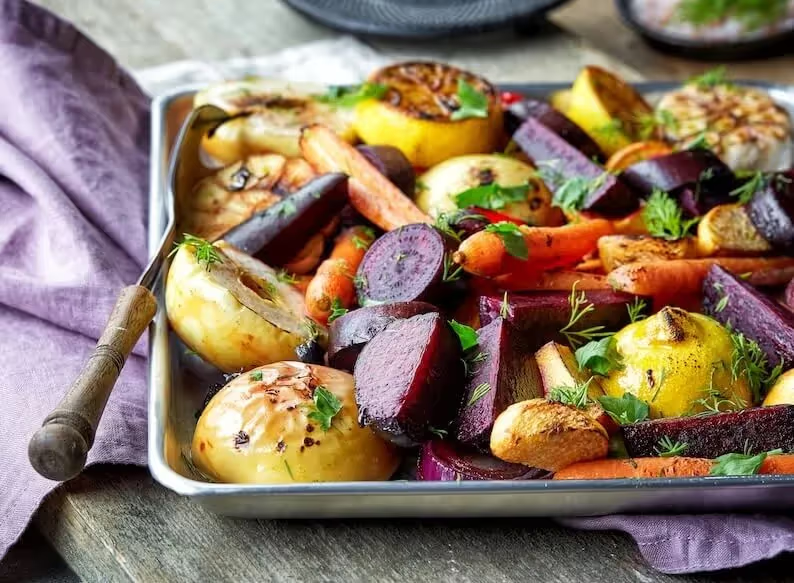As winter settles in and the temperatures drop, many of us find ourselves craving foods that are warm, filling, and comforting. This season often brings a slower pace, encouraging us to spend more time indoors with family, friends, and delicious food. But winter foods don't just comfort us—they also provide essential nutrients to keep our bodies strong, resilient, and energized throughout the colder months. Here's a look at some seasonal winter foods that are both hearty and nutritious, along with a simple, healthy recipe to bring warmth to your table.
Root Vegetables: The Winter Nutrient Powerhouses
Root vegetables are some of winter's most beloved produce, and for good reason. These vegetables grow underground, making them nutrient-dense and loaded with vitamins, minerals, and antioxidants. Root vegetables such as carrots, sweet potatoes, turnips, parsnips, and beets are naturally sweet and rich in fiber. They help fuel the body, keep blood sugar steady, and promote a healthy digestive system. The beauty of root vegetables lies in their versatility—they can be roasted, mashed, added to soups and stews, or even enjoyed raw in salads. Additionally, root vegetables are a great addition to hearty dishes like pot roast, adding a touch of sweetness and depth of flavor to these winter staples.
Lean Proteins: Fuel for Winter Wellness
Protein is an essential macronutrient, and it's particularly beneficial in winter when our bodies need extra energy to stay warm. Lean cuts of meat, such as turkey, chicken, and lean beef, provide high-quality protein without excess saturated fats. For those who enjoy seafood, fatty fish like salmon, trout, and sardines are excellent sources of protein and are high in omega-3 fatty acids, which support heart health and reduce inflammation. Incorporating lean proteins into winter meals can also give you that satisfying, "stick-to-your-ribs" feeling without being overly heavy. Slow-cooker recipes, in particular, are ideal for lean proteins. These dishes require minimal effort, allowing you to create flavorful, tender, and nutrient-rich meals that cook slowly and develop deep flavors.
Broths and Soups: Nourishment in Every Sip
When it comes to winter foods, nothing is more comforting than a warm, nourishing bowl of soup. Not only are broths and soups hydrating, but they are also an excellent way to pack in a variety of nutrients. For instance, a classic noodle soup with vegetables provides hydration, protein, vitamins, and minerals in each spoonful, making it an excellent choice for an easy, balanced meal. Noodle soups can also be customized to include your favorite vegetables, proteins, and herbs. Bone broth, in particular, is a fantastic base for winter soups and stews, rich in collagen, minerals, and amino acids that support joint health, immune function, and gut health. Whether you're making a simple vegetable broth or a more elaborate chicken noodle soup, these warming bowls are perfect for winter nights.
Whole Grains: Sustained Energy for Cold Days
Whole grains such as quinoa, brown rice, barley, and oats provide complex carbohydrates that break down slowly, releasing a steady stream of energy to keep you feeling fuller for longer. Unlike refined grains, whole grains contain essential nutrients like fiber, B vitamins, magnesium, and iron, supporting digestive health and heart health. Adding whole grains to winter meals can elevate both the nutrition and the texture of your dishes. Try incorporating whole grains into winter dinners, such as a barley and vegetable soup or a brown rice and veggie stir-fry. Oats also make a great breakfast option, as warm bowls of oatmeal can be topped with fruit, nuts, and spices to create a satisfying and wholesome start to the day.
Citrus Fruits: A Boost of Vitamin C
Citrus fruits, including oranges, grapefruits, lemons, and limes, are in season during winter, providing a refreshing burst of flavor and essential nutrients. They are rich in vitamin C, a powerful antioxidant that supports immune health, skin health, and wound healing. Plus, citrus fruits are hydrating and low in calories, making them an easy addition to your diet. Citrus fruits can add a zesty kick to savory dishes, brighten up salads, or be enjoyed as a quick snack. You can also use lemon or lime juice to flavor soups, marinades, and dressings, giving your meals a fresh taste that balances out the hearty flavors of winter foods.
Easy and Healthy Slow-Cooker Winter Pot Roast Recipe
This easy winter pot roast combines lean protein, hearty root vegetables, and flavorful herbs, creating a delicious and health-boosting winter dinner. As the cold weather sets in, let this warming recipe and nutritious winter foods become staples in your kitchen for a season of comfort and wellness. Ingredients: 2 lbs lean beef chuck roast 1 cup beef broth Salt and pepper, to taste 1 tbsp olive oil 4 carrots, chopped into large pieces 2 parsnips, chopped into large pieces 2 medium potatoes, quartered 1 large onion, sliced 3 garlic cloves, minced 1 tbsp Worcestershire sauce 1 sprig fresh rosemary (or 1 tsp dried) 2 sprigs fresh thyme (or 1 tsp dried) Instructions:
- Season the beef chuck roast generously with salt and pepper. In a large skillet, heat olive oil over medium-high heat. Sear the roast for two to three minutes on each side until browned.
- In the slow cooker, layer the carrots, parsnips, potatoes, onion, and garlic. Place the browned roast on top of the vegetables.
- In a small bowl, mix the beef broth with Worcestershire sauce and pour it over the roast and vegetables. Add the rosemary and thyme.
- Cover the slow cooker and cook on low for seven to eight hours or on high for four to five hours until the meat is tender and falls apart easily.
- Serve hot with a side of crusty bread or over whole-grain noodles for an extra "stick-to-your-ribs" feel.




